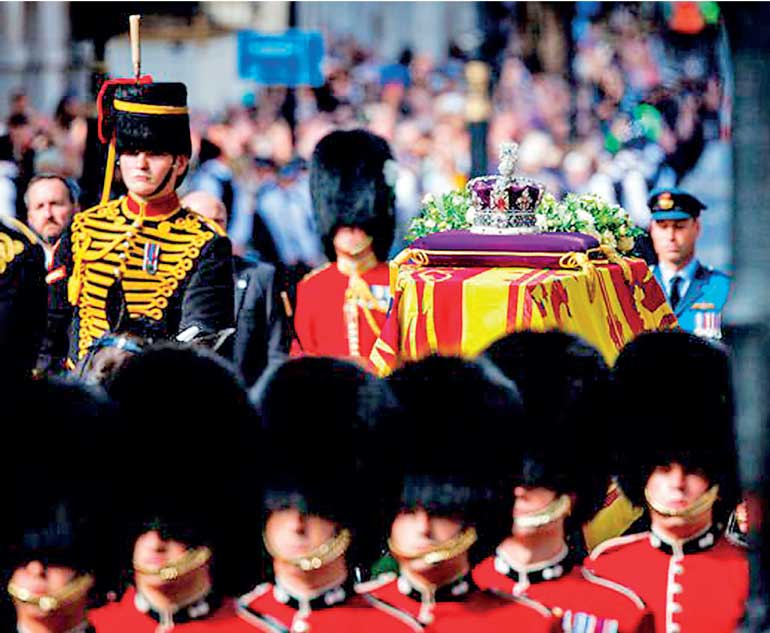Sunday Feb 15, 2026
Sunday Feb 15, 2026
Saturday, 1 October 2022 00:05 - - {{hitsCtrl.values.hits}}

Here was something straight out of legend, a display of surpassing grandeur, all the more magnificent in the prevailing commonness of our republican era, with an egalitarian ethos. A farewell as splendorous now belongs to history, we will not see such again
 “Success requires no apologies; failure permits no alibis”
“Success requires no apologies; failure permits no alibis”
For nearly a week, the world sat enthralled before their television sets as the funeral formalities for Queen Elizabeth II progressed, a sombre spectacle of a nation mourning the passing of a cherished monarch.
Here was something straight out of legend, a display of surpassing grandeur, all the more magnificent in the prevailing commonness of our republican era, with an egalitarian ethos. A farewell as splendorous now belongs to history, we will not see such again.
Great Britain is an extraordinary story, how a smallish island in the North Atlantic came to play such a crucial role in the world’s affairs confounds historians to this day. British settlements in the far corners of the world, US, Australia, Canada and New Zealand, like her, have gone on to become rich and powerful nations.
So dominant has its culture become, English is the preferred language of business across the globe, principles of law mainly developed in that country, have come to be the measure of justice in many a country. The sight of our smartly dressed nurses briskly assisting the sick, brings to mind the name of Florence Nightingale, the English lady with the lamp.
When we notice a young scout helping a blind man to cross the road, we think of Baden-Powell, the founder of the movement. There was an Englishman, Charles Darwin, proving that we humans did not appear on earth in one powerful flash, but evolved gradually, based on a process of natural selection.
In our own times was the theoretical physicist Stephen Hawking, considered one of the greatest minds ever, giving us “A Brief History of Time”, and then on the origin and the fate of the universe in “Theory of Everything”, the very scope of his endeavours is awe inspiring.
Having come to accept the mediocrity of our politics, we will find it difficult to believe that Great Britain once had a Prime Minister who not only led that nation in a cataclysmic World War, but also devoted himself to writing, winning the Nobel Prize for literature.
In England it pays to be a man of letters, his lavish lifestyle was supported mainly with earnings from books and newspaper articles. Winston Churchill: politician, writer, orator, soldier, sportsman, painter, bricklayer and landscaper, is considered the greatest Englishman of the 20th Century.
Britain’s constant battles
Accompanying the Royal cortege were the cavalry marching at a slow gait. Their trot has not always been slow, British cavalry has galloped across all continents, braved arid deserts, crossed fast flowing rivers and climbed forbidding mountain ranges to assert British power.
It was not only primitive tribesmen they fought, at various times, the British Army clashed with the strongest of armies, Germans, French, Russians and so on, regularly beating them. If they were good soldiers, they were superlative sailors, for more than a Century the British Navy ruled the waves.
When the venturesome Europeans began arriving in the soon-to-be colonies around the 15th Century, then found societies already in decay, a rigidly stratified social order ruled by ignorant despots; no match, either in military prowess or economic capabilities, to the explorers.
In fact, the natives were stupefied by the big ships, guns, uniforms and even the tireless manner in which the strangers drove their undertakings. Almost at the first encounter, the battlements gave way; the native feudal lords, recognising the pending doom, either ran away or made deals with the foreigners.
Empire building is not for the faint-hearted, the task demands fire, blood, pain and toil. However, relative to other empires such as the Romans or the Mongols, violence was only occasional, there is a general acceptance that the British rule by and large, provided stability in the acquired lands, with new social and economic opportunities for the people.
What was gained from the British rule
Nascent capitalism opened fresh avenues for hitherto peripheral segments, the beneficiaries experiencing a huge social climb. As ‘nobodies became somebodies’, a new gentry emerged. Eventually, when the colonised nations began agitating for greater independence, the cry came primarily from former students who had studied in British universities.
They were not only introduced to novel ideas like parliaments, legal systems and new professions, the stint in England gave them prestige and acceptance in their native countries, propelling them to leadership in the independence movements.
Although the British acted in the name of their sovereign, the fact is that from about the 17th Century British royals have been titular monarchs, reigning but not ruling. While preserving with respectful affection, the institution of the monarchy as a symbol of their nation, the British have kept pace with modernity, creating a society second to none in terms of social advancement as well as an extremely effective economy.
Unlike most countries, Britain does not have a codified Constitution. Instead, an amalgam of common law, conventions, statutes, works of authority and royal prerogative making up their Constitution.
To appreciate the political skills of the British, we have to only contrast them with the dystopian society we have created after 70 years of unbroken ballyhoo. In this period, Sri Lanka has had two constitutions (with frequent amendments), several country-wide initiatives, numerous mega projects, many so called reforms; of course, all launched at auspicious times, with the customary festivity and big talk. Today the country is bankrupt.
In a controversial criminal case, when we need an untainted Police investigation, what is immediately suggested is Scotland Yard. We may not produce a Napoleon, however one of our cadets passing out from Sandhurst is near enough for us. It may be difficult to find the perfect man, but we have our graduates from Oxford!
Colonial hang ups or not, we cannot deny that in recent times, many Sri Lankans have found refuge in Great Britain to escape from persecution or worse, by his own State. Many more thousands have found their economic heaven there. Now we don’t have the right of appeal to a British Court. If such a right existed, one wonders the outcome of many high-profile cases.
Prickly of criticism, when called upon to balance between its good name and the right to comment/criticise, our courts tend to emphasise the former. Entrusted with the exercise of the people’s judicial power, courts of law are public institutions, run with public money.
The right of expression is the bedrock of democracy; the critic may be intemperate or ignorant, in their response however, public institutions must be enlightened, objective and just. Respect is to be earned, not commanded.
Standing before the ceremonial catafalque holding the Queen’s coffin, President Ranil Wickremesinghe would have pondered the commonalities between our two nations. We are both island nations.
On the British coat of arms is a lion and a unicorn. The lion is our symbol too. Thereafter, the commonalities become hazy, uncertain. Do the British read books? Reading is so much a part of that culture, it invites no comment. Both countries declare themselves to be democracies, there surely is a wide gap between form and substance.
Great Britain’s Head of State is a hereditary monarch, while according to the Sri Lankan Constitution our Head of State should be elected by the people. Being an experienced politician, Wickremesinghe would have recognised the deep affection the British have for their departed Queen. To live in the hearts and minds of the people, is the true mandate. In our country, a mandate is a much-abused concept, a licence obtained with questionable methods and then claimed in perpetuity.
We who are floundering in our man-made wretchedness salute the departed Queen, a monarch who reigned with acceptance, dignity and decorum.